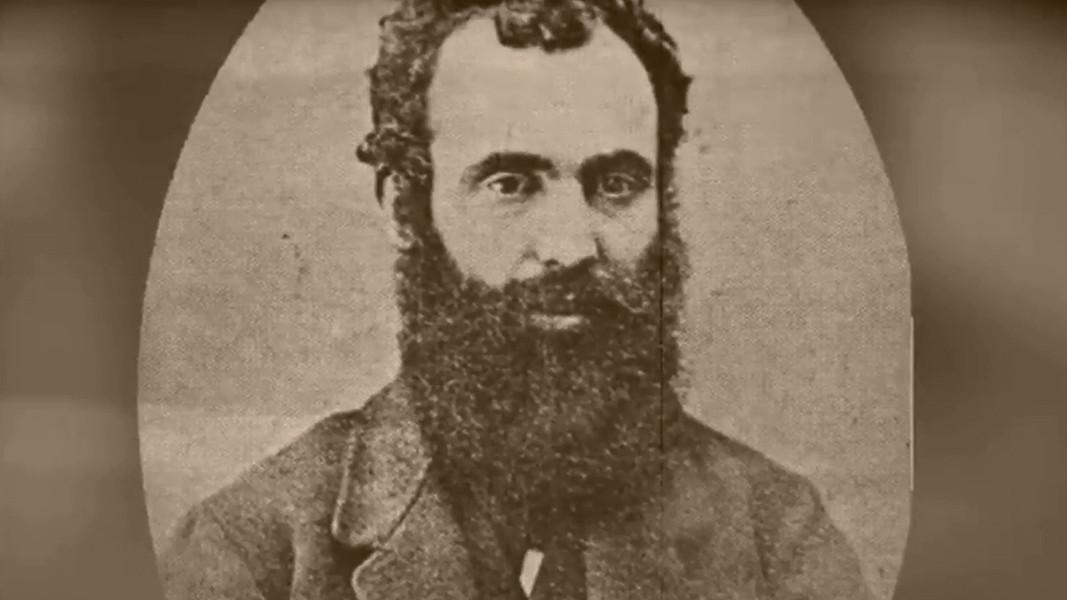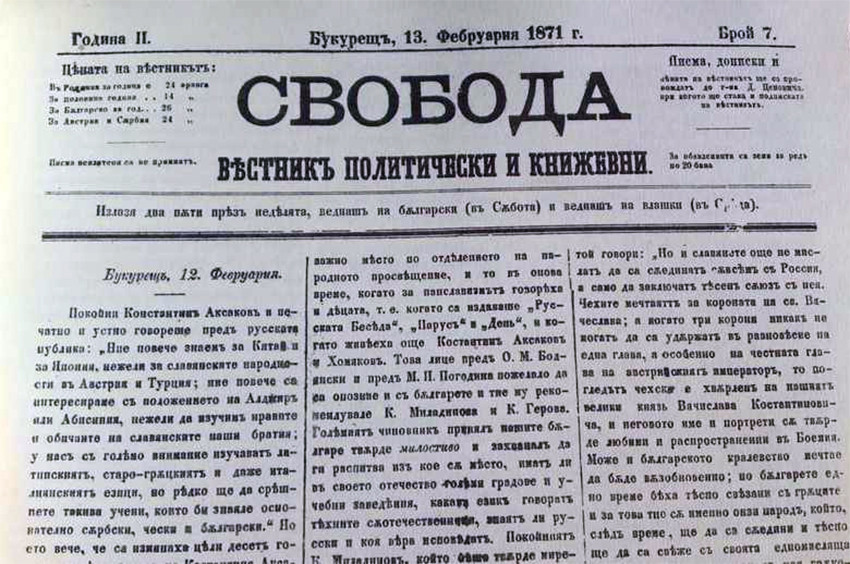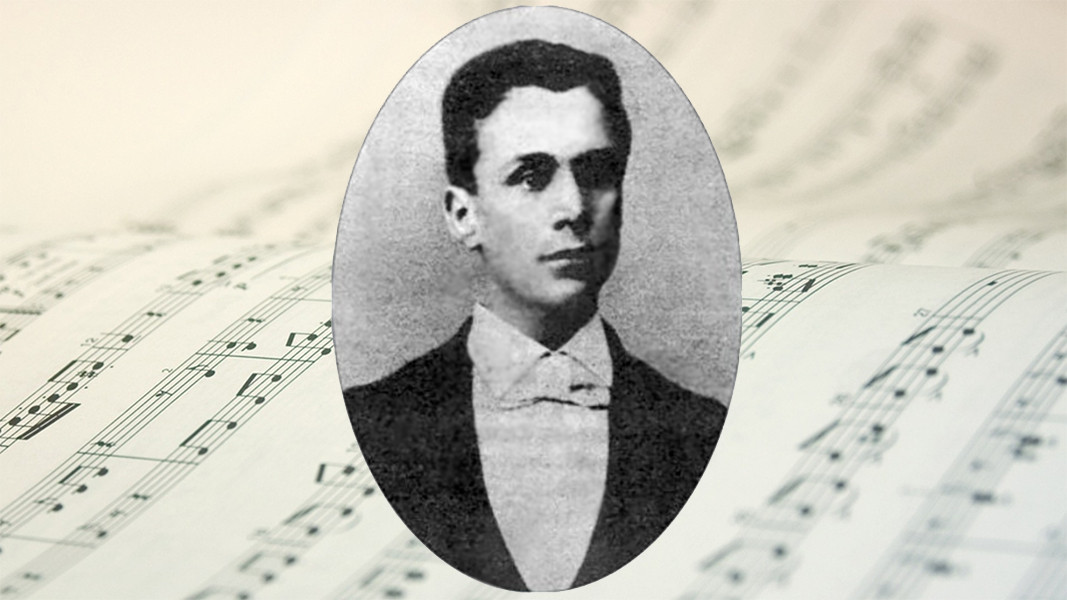Lyuben Karavelov (1834–1879) was one of the most prominent figures in Bulgaria’s national liberation movement - an exceptionally knowledgeable person, writer of poetry and fiction, publicist and folklorist.

After years of studying and working outside his hometown of Koprivshtitsa and abroad—studying in Plovdiv and Edirne, and later moving to Constantinople, Odessa, Belgrade and Novi Sad—Karavelov went to Bucharest, where he quickly became part of the circle of revolutionary-minded Bulgarian emigrants.
Thanks to his oratorical talent, he soon emerged as one of their most influential voices. His main weapon was the newspaper ''Svoboda/Freedom'' —a platform for his ideas that attracted many revolutionaries. He played an important role in the establishment of the Bulgarian Central Revolutionary Committee (BRCC). He was the leading figure who united much of the émigré community, supporting the decision to take the path of armed struggle under the influence of Georgi Rakovski’s ideas and Vasil Levski’s practical experience.

After the death of the Apostle of Freedom (Vasil Levski) in 1873, Karavelov thoroughly re-evaluated his activities and withdrew from the revolutionary circles, believing that freedom could be achieved only through enlightenment. That is why, after 1874, he devoted himself entirely to literary and educational activities.
In 1875, Lyuben Karavelov wrote his famous poem ''Hubava si Moya Goro/ You Are Beautiful, Oh Forest Mine'' — a nostalgic tribute to his homeland’s nature. The verses praise the enchanting beauty of the motherland, sacred to every Bulgarian, especially when far away from it. Fated to spend his most active years abroad, Karavelov constantly longed for his fatherland. In these verses, he returns to his homeland to express his admiration, love and sorrow.
About a quarter of a century later, the young composer Georgi Goranov composed a melody for the elegy, which has since become a national classic.
 Goranov (his original name was Georgi Dimitrov Yovev) was born in 1882 in the town of Kyustendil (Southwestern Bulgaria), to a family of Macedonian Bulgarians- emigrants. He studied at the Pedagogical School in his hometown, where he demonstrated a strong musical talent, participating in the school choir and amateur orchestra.
Goranov (his original name was Georgi Dimitrov Yovev) was born in 1882 in the town of Kyustendil (Southwestern Bulgaria), to a family of Macedonian Bulgarians- emigrants. He studied at the Pedagogical School in his hometown, where he demonstrated a strong musical talent, participating in the school choir and amateur orchestra.
In 1900, the renowned Czech composer, music theorist, folklorist and researcher of Bulgarian folk music Karel Antonin Machan was appointed as a music teacher in Kyustendil. Karel Machan had a profound influence on the town’s musical life. He founded a four-part choir of 100 people, a large string and mixed orchestra, and organized a singing society, which later evolved into the "Kaval" choir. Among his students, besides Georgi Goranov, was also the famous composer Nikola Atanasov, the author of the first Bulgarian symphony.
Recognizing Goranov’s great musical talent, Karel Machan encouraged him to devote himself entirely to music. Georgi Goranov began composing songs and short orchestral pieces. In 1902, he left for Zagreb to study music but had to return due to illness. He died at the young age of 23 in Kyustendil. He composed about 80 songs, among them the popular ''Osvobozhdenie'', ''Stanete, stanete'', ''Ya zapey mi, Makedonko'' and ''Yunak na gora dumashe''. He also wrote pieces for violin, mandolin orchestra, waltzes, mazurkas and polkas.

At the suggestion of the renowned folklorist Rayna Katsarova, "You Are Beautiful, Oh Forest Mine" was embraced as the unofficial anthem of Koprivshtitsa and of the National Festival of Bulgarian Folk Art, first held in 1965. Today, the song is particularly popular among the many Bulgarians living abroad. Alongside "Tell Me, White Cloud" by Ran Bosilek, it has become a symbol of Bulgarian emigrants.
One of the most moving performances of this national classic is by the Bulgarian National Radio Mixed Choir and the Bulgarian National Radio Symphony Orchestra, conducted by Mihail Milkov—a figure with a remarkable contribution to Bulgarian choral art.
We offer you a more modern rendition here - performed by the Bulgarian National Radio Children’s Choir. The recording is from the festive concert celebrating the National Enlighteners Day, held at Bulgaria Hall on November 1, 2024. The soloist is Viktoria Lyubomirova.Often described as “the Bulgarian Verdi” or “the Bulgarian Puccini,” composer Parashkev Hadjiev (1912–1992) has long been recognised as a central figure in Bulgaria’s operatic tradition. The country’s most prolific creator of musical-stage works, he left..
Admirers of schlager music and expressive stage presence are certainly looking forward to the pre-Christmas meeting with Veselin Marinov. It has already been a long-standing tradition for the singer to have a concert in the National..
Photos: ubc-bg.com, архив, Facebook/ Filmotechno podcast Discover more Bulgarian music in Radio Bulgaria's series "Highlights of Bulgarian musical culture": Highlights of Bulgarian musical culture: ''Barefoot times'' -..

+359 2 9336 661
